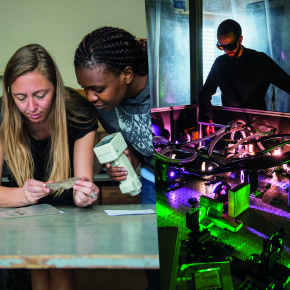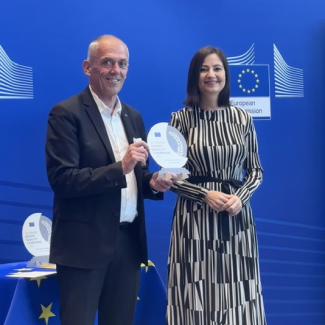
The CNRS is offering 25 tenure-track positions
With an “entry package” approaching 300,000 euros, and a promise of tenure upon the contract’s completion, this new recruiting effort aims to attract scientists from beyond the world of French higher education and research. The application period will run from 20 May to 31 August.
The CNRS is recruiting for 25 tenure-track positions across multiple scientific fields ranging from sustainable metallurgy to artificial intelligence, open science, and the Earth’s habitability (find out more and apply here). “These positions provide an opportunity to enhance the attractiveness of French research and the CNRS. They will attract candidates from interesting backgrounds, notably scientists holding positions abroad who would like to work in France,” indicates Antoine Petit, Chairman and CEO of the CNRS.
Financed by the French Ministry of Higher Education and Research (MESRI) and the French National Research Agency (ANR), these positions have an average “entry package” of 200,000 euros over a period of 3-6 years, with the CNRS adding a doctoral contract (approximately 110,000 euros) to enable candidates to conduct cutting-edge research.
These new contracts were provided for in Article 4 of the 2020 Research Programming Law (LPR), which created a new path for conditional tenure-track as a complement to the existing methods used to recruit researchers and senior lecturers. In 2022, 137 tenure-track positions were on offer, including 88 in higher education institutions and 49 in research organizations, as opposed to a total of 92 in 2021.
Tenure-track positions will not count toward staff limits at the CNRS
Under the LPR, tenure as a researcher will be granted for these 25 tenure-track positions upon completion of a 3-6 year contract. “This will help attract candidates with more senior backgrounds than the traditional competitive examinations used for researchers, who will now become senior researchers much more quickly,” points out Antoine Petit. “These tenure-track positions will not count toward CNRS staff limits,” indicates Hugues de La Giraudière, the organization’s Director of Human Resourcers. “In 2022, the CNRS will recruit 250 researchers as it has every year since 2019, but will also propose these 25 tenure-track positions, thereby increasing our job offerings for researchers.”
Addressing major scientific challenges
Covering 25 subject areas, the tenure-track positions proposed by the CNRS are in keeping with the scientific focuses of the Priority research programmes and equipments (PEPRs) from the fourth Investments for the Future Programme (PIA4), the EquipEx+ launched by PIA3, and the six challenges from the CNRS Objectives and Performance Contract. “The CNRS’s ten institutes identified a number of fields in which they would like to secure tenure-track positions, and we then made choices with respect to the subject areas,” stresses Alain Schuhl, Chief Research Officer of the CNRS. “A genuine scientific strategy was implemented in connection with these tenure-track positions.”
For instance, the National Institute of Sciences of the Universe (INSU) is counting on this “important tool” to complement the recruiting process for researchers and senior researchers. “Our mission is to continue the major research observation services that generate data essential to our understanding of the Earth—and that especially contribute to the work of the IPCC,”1 explains INSU Director Nicolas Arnaud. The institute decided to allocate tenure-track positions to support its astronomers and physicists, with a view to creating senior researcher positions dedicated to observation. INSU secured two positions, one in astronomy based at the Paris Observatory,2 and a second in atmospheric chemistry, which will be directed in partnership with l'Université de Versailles Saint-Quentin-en-Yvelines.
With respect to the Institute of Biological Sciences (INSB) of the CNRS, two orientations were given priority. “We decided to use the tenure-track positions to strengthen a subject area relating to a need identified within a specific laboratory, such as the Microbiota and Pathophysiology tenure-track position that will be based at the Experimental and Molecular Immunology and Neurogenetic laboratory3 in Orléans. Or to strengthen a strategic subject area, such as the Structural Cellular Biology tenure-track position, namely by instilling competition among a number of research units working on this subject,” observes INSB Director André Le Bivic.
The CNRS’s 25 tenure-track positions were conceived “as part of a national recruiting apparatus distributed across the entire territory,” stresses Antoine Petit. While some are already associated with a specific laboratory, two-thirds remain open to different laboratories, and will be more precisely earmarked based on the selected candidate’s profile. While these tenure-track positions are “purely CNRS,” they were allocated with the agreement of the universities and schools that share co-supervisory authority over the joint research units and will be overseeing the teaching assignments.
The application period will run from 20 May to 31 August 2022.
For the complete list of the CNRS’s 25 tenure-track positions, and to apply, click here.


